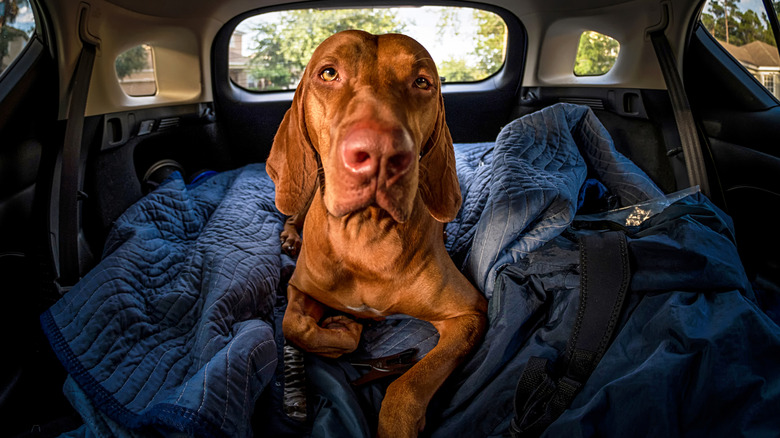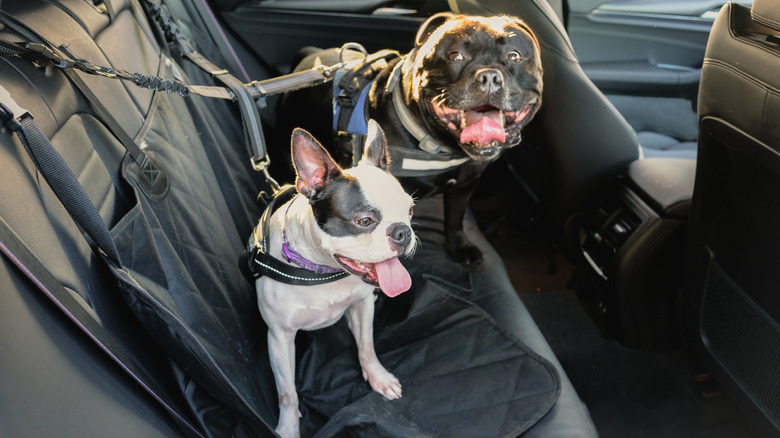How To Deal With A Dog's Motion Sickness During Long Drives
We may receive a commission on purchases made from links.
When picturing a dog in a car, many envision a happy pooch with its head out of the window, soaking in the sights and sounds with a smile on its face. However, this isn't the case for all pets, with around 15% of dogs suffering from motion sickness. Having to deal with a sick dog making a mess of a car can be daunting, and sadly, furry friends who suffer from motion sickness are sometimes left out of travels with their favorite people.
To help pet parents figure out ways for their dogs to overcome motion sickness, Cuteness spoke exclusively to Dr. Gary Richter, the founder of Ultimate Pet Nutrition. One major factor that can lead to motion sickness is anxiety. On this, Dr. Gary Richter tells us, "If there is time, it is sometimes possible to gradually acclimate dogs to riding in the car through desensitization training." He further outlines a plan: "Begin by sitting in the car with the dog when it is not moving. Feed them treats. Make it a game for them to get into the car." After successfully getting them used to a still vehicle, you can expand the process. "Eventually, take very short (5 minutes) trips with the dog and make sure there is a great reward at the end," Dr. Richter explains. What this reward is can vary, whether you take your dog to its favorite park or give it a yummy treat.
Through desensitizing to the process, an anxious pup can turn into a happy dog going on a heckin' good car ride with its owner. However, some dogs require more than training and may need aids to help them on a trip. So, whether you need to spend some extra time leading up to a big trip or explore medical aid, there are ways to overcome motion sickness.
Finding the proper medication to help a dog with motion sickness
Dr. Gary Richter emphasizes the importance of testing any medication before a long trip to monitor for side effects and consulting with your veterinarian beforehand. "One of the best is Bonine. This is an OTC (over the counter) motion sickness medication for people that can also be used for dogs," Dr. Richter exclusively tells Cuteness. Curious how to use it? "The dose is 1/2 to 1 mg per pound of body weight. For example: A 30-pound dog would get 15-30 mg. Bonine can be used once daily, and it is very important to give it at least 45 minutes to 1 hour prior to getting in the car," Dr. Richter explains. For a pet parent, avoiding potentially harmful substances that can appear in some OTC medicines, such as xylitol, is vital.
You can purchase Bonine Non-Drowsy Motion Sickness Relief without a prescription, but a vet can provide a tailored recommendation to a car-sick dog. "There is also a prescription medication called Cerenia (maropitant citrate) that is used for motion sickness," Dr. Richter notes. A veterinarian may also be able to address the underlying cause of the motion sickness, such as anxiety, through medication. Alternatively, pet parents can use natural products, such as Adaptil ThunderEase Dog Calming Pheromone Spray or Nutramax Solliquin Calming Behavioral Health Supplement, to help calm their dog before a trip. Furthermore, letting a dog bring its absolute favorite toys to hold onto is a free way to help alleviate stress.
Other factors that can cause motion sickness in dogs
Some good news is that no dog is more prone to motion sickness than others. "Motion sickness does not seem to be more prevalent in certain breeds or sizes of dogs," Dr. Gary Richter exclusively explains to Cuteness. However, other factors can lead to motion sickness. Knowing your dog's limits in training and not pushing it is crucial. Making note of how long a dog can ride in a car will also help avoid extended discomfort and motion sickness. Puppies and young dogs (under 1 year old) are susceptible to motion sickness because their inner ears, which help with balance, aren't yet fully developed.
Specific medical issues can also increase the likelihood of motion sickness. For instance, an inner ear infection can cause agitation and imbalance. Alternatively, vestibular disease, which affects the system that maintains a dog's balance, can be exacerbated during a car ride. Some medications may also have side effects, including dizziness. For those who love to travel with their furry friend by their side, discussing this with a veterinarian before starting new prescriptions is vital. Ultimately, the symptoms of motion sickness are often manageable, and it's up to a pet parent to address potential issues to ensure a smooth trip for both them and their canine companion.
Now, check out the travel essentials every dog owner should have.


